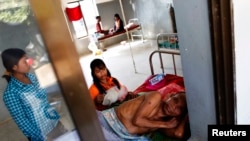Malaria infections in Cambodia and the Greater Mekong sub-region fell overall in 2015, according to health officials. But the continuing spread of drug-resistant parasites that cause the disease remains a major concern for local and international health authorities.
Statistics from last year show how successes in battling malaria in Cambodia are being undermined by a continued failure to contain resistance to the drug artemisinin, which was once considered an anti-malaria wonder drug. Resistance to the drug was first discovered in western Cambodia in the former Khmer Rouge territory of Pailin in 2006.
Huy Rekol, director at the Ministry of Health’s National Center for Malaria Control, told VOA Khmer that Cambodia recorded 51,200 cases of malaria last year, which represents a 9 percent drop in the previous year.
He said just 10 people died from the disease in the year, compared with 18 deaths in 2014.
However, drug resistance has now expanded into provinces in the north and northeast of the country, he said, explaining that artemisinin-resistant forms of a malaria-causing parasite had now been found in Stung Treng, Ratanakkiri, and Mondulkiri provinces.
“Based on our studies from 2013, we found that the drug resistance was occurring only in six provinces. But now it’s expanded to another three provinces, so it’s totally in nine provinces now,” Huy Rekol said.
The migration of people around the country for work was spreading drug resistance, which develops when patients infected with malaria-causing parasites are given incorrect doses or do not complete their course of anti-malarial drugs, he said.
A World Health Organization (WHO) update published in September noted that a combination of artemisinin and a partner drug was being used successfully to cure patients in the region found to have drug-resistant forms of the malaria-causing parasite Plasmodium falciparum.
But this approach, known as Artemisinin-based combination therapy, has started to fail in Cambodia.
Scientists believe mutations are taking place within a protein known as Kelch 13, or K13, and that those mutations are getting faster. Therefore, the Cambodian government and its partners must shuffle between different combinations of drugs every five years, Huy Rekol said.
“Now, the development of the parasite is very fast,” Huy Rekol said. “This means, we should be more careful, as the parasite is developing very fast if we keep using the same medicine for more than five years.”
As an example of how resistance can make a drug useless within just a few years, Siv Sovannaroth, technical bureau chief at the National Center for Malaria Control, said that combination drugs used since 2008 were now increasingly failing.
A combination using the drug DHA Piperaquine was initially only failing to cure malaria in 10 percent of cases, he said. Since late 2014, however, it has been failing in 30 percent of cases.
Another drug, Artesunate mefloquine—previously used from 2008 in combination with artemisinin—was reintroduced in late 2015, but only after delays caused by paperwork and slow ordering, Siv Sovannaroth said.
The failure to stop the spread of drug resistance in Cambodia is a global concern, with experts warning of a major disaster if mutations spread to sub-Saharan Africa, where malaria can be fatal in about 90 percent of cases.
But simply reshuffling the drugs may never completely contain the problem, Siv Sovannaroth said.
“The general assumption nowadays is that containment of the artemisinin resistance is impossible, because resistance not only spreads, but also emerges on its own [through mutations],” he said. “Therefore, the only way to eliminate drug resistance is to eliminate malaria.”
The WHO has adopted a policy to eliminate malaria entirely from the countries in the Greater Mekong sub-region by 2030, and has pledged $3 billion for Cambodia, Thailand and Laos to that end.
The Cambodian government itself launched a five-year action plan on malaria last week, announcing that it would spend about $142 million.
Huy Rekol said his department was seeking for its work half of the entire budget of the action plan, which is part of a 25-year plan signed by Prime Minister Hun Sen in 2011.
“First, we focus on the medical diagnosis and curing malaria. Secondly, prevention of spreading agents by using mosquito nets or preventing the infection from one mosquito to another,” he said, adding that the government was also working to eradicate counterfeit anti-malaria drugs, improve its monitoring systems and educate local communities about malaria.








